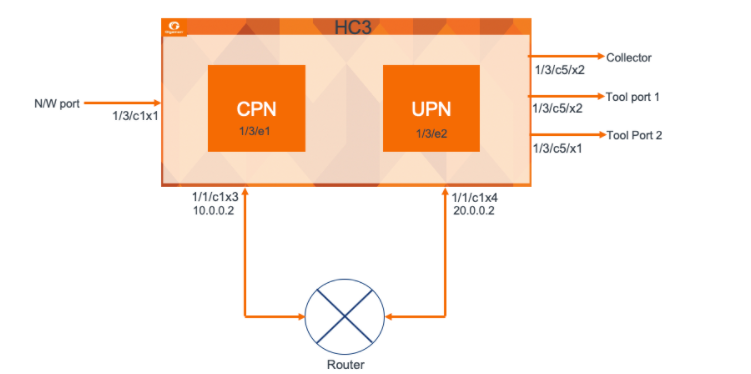Configuration of 5G Correlation
The 5G Correlation feature correlates the 5G Control and User packets to deliver it to different tool ports based on the filtering policies configured. The control and user packets are processed in Control Processing Node (CPN) and User Processing Node (UPN) located in same or different locations, and then the packets are sent to the tools.
This is a configuration example of 5G Correlation.

|
S.No |
Task |
Command |
Refer to Command |
||||||
|---|---|---|---|---|---|---|---|---|---|
|
1. |
Define port group/tool ports. |
(config) # gsgroup alias cpn-5g port-list 1/3/e1 (config) # gsgroup alias upn-5g port-list 1/3/e2
|
|||||||
|
2. |
Create a GSGROUP
|
(config) # gsparams gsgroup cpn-5g
(config) # gsparams gsgroup upn-5g
(config) #3gpp-node-role user
|
|||||||
|
3. |
Define the node role. |
(config) # 3gpp-node-role control 5g 12000
(config) #3gpp-node-role user
|
|||||||
|
4. |
Define the whitelist and attach it. |
|
|||||||
|
5. |
Configure IP interface. |
(config) # ip interface alias cpn-ip attach 1/1/c1x3 ip address 10.0.0.2 /24 gw 10.0.0.1 gsgroup add cpn-5g exit ip interface alias upn-ip attach 1/1/c1x4 ip address 20.0.0.2 /24 gw 20.0.0.1 gsgroup add upn-5g exit |
|
||||||
|
6. |
Create exporter/listener configs for SFFP communication. |
(config) # apps exporter alias cpn5000-5050exp type gtp-cups source leader in a bidirectional clock relationship (formerly master) interface ip-interface cpn-ip source l4 port 5000 destination l4 protocol tcp destination l3 ip dscp 0 destination l3 ip ttl 64 destination l3 protocol ipv4 gsgroup add cpn-5g exit
(config) # apps listener alias upn-list-5050 type gtp-cups l4 port-list 5050 l4 protocol tcp l3 protocol ipv4 l3 ttl 64 l3 dscp 0 mode l3 interface gsgroup add upn-5g exit |
|
||||||
|
7. |
Create whitelist/ Flow sample GSOP (LB or non LB). |
|
|||||||
|
8. |
Create SFFP Profile and attach it to GSPARAMS. |
(config) # sffp-profile alias 5GCpnUpnSp profile add ip-interface 10.0.0.2 port 5000 type control sx-ips 10.80.2.30,fdc0:0:0:410::20 profile add ip-interface 20.0.0.2 port 5050 type user sx-ips 10.50.2.70,fdc0:0:0:210::177 exit |
|||||||
|
9. |
Create a Vport. |
vport alias vport-cpn gsgroup cpn-5g vport alias vport-upn gsgroup upn-5g |
|||||||
|
10. |
Define first level map to send the traffic to Vport. |
map alias gtp-u type firstLevel byRule roles replace admin to owner_roles rule add pass portsrc 2152 bidir to vport-upn from 1/3/c1x1 exit
map alias 5g-ctl type firstLevel byRule roles replace admin to owner_roles rule add pass portsrc 80 bidir rule add pass portsrc 8080 bidir rule add pass portsrc 8090 bidir to vport-cpn from 1/3/c1x1 exit
map alias pfcp type firstLevel byRule roles replace admin to owner_roles rule add pass portsrc 8805 bidir to vport-cpn,vport-upn from 1/3/c1x1 exit |
|||||||
|
11. |
Create second level map with Flow sample/ Whitelist rules. |
map alias cpn-5g-fs-map type secondLevel flowSample-5g roles replace admin to owner_roles use gsop fs-cpn flowsample add 5g percentage 100 to 1/3/c5x1 from vport-cpn exit
map-scollector alias 5g-collector roles replace admin to owner_roles from vport-upn collector 1/3/c5x4 exit
map alias upn-5g-fs-map type secondLevel flowSample-5g roles replace admin to owner_roles use gsop fs-upn flowsample add 5g percentage 100 to 1/3/c5x2 from vport-upn exit |
|||||||
|
|
|
|
|



